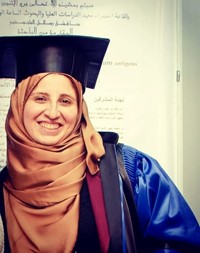Sally Waheed Yousief
 Email: sally.waheed@alexu.edu.eg
Email: sally.waheed@alexu.edu.eg
Twitter: @SallyWaheed1
Affiliation:
Department of Biomedical Sciences
University of Sassari
Sassari, Italy
Education and experience
I obtained my BSc degree in Chemistry-Biochemistry from the Faculty of Science, Mansoura University, Egypt. Through my four years programme, I was given the opportunity to study a wide range of basic science topics within the field of biology and chemistry in 2009. Then, I finished a diploma in Analytical Biochemistry from the Faculty of Science University of Alexandria, Egypt in 2010. I was fascinated by science and how could different disciplines cooperate to solve life-threatening issues. Finally, I got the opportunity to join and register in a suitable master's program and start my own academic research journey.
I obtained my MSc degree in Biotechnology in 2019 from Biotechnology Department, Institute of Graduate Studies and Research, Alexandria University, Egypt My research combined different disciplines as molecular biology, microbiology, bioinformatics, immunology and histology targeting a novel vaccine candidate for one of the antibiotic-resistant bacteria, vancomycin-resistant Enterococcus faecium. In addition, I have graduated with an excellent grade (GPA 3.586) and worked for three years (2011:2013) as an instructor for multi groups of undergraduates for courses as Biochemistry and Molecular biology.
My thesis was entitled “Molecular study on potential Enterococcus faecium antigens through recombinant DNA technology” and this study investigated the feasibility of cloning, expression of E. faecium potential antigens and extended to explore the usages of these antigens as protective vaccine candidates.
Eventually, the research I have conducted has been published on October, 2019 under a title “Immunization with the basic membrane protein (BMP) family ABC transporter elicits protection against Enterococcus faecium in a murine infection model” https://doi.org/10.1016/j.micinf.2019.09.002.
ESR3: Metabolism of Staphylococcus aureus during systemic and skin infection.
Project description:
Antimicrobial resistance is a growing medical challenge. Staphylococcus aureus is an important human and animal pathogen, and so-called MRSA variants of this bacterium are on the WHO list of bacteria, for which novel drugs are urgently needed. The project will characterize the metabolism of an MRSA strain during systemic and skin infection with Staphylococcus aureus in mice using a random transposon approach (TraDis) to identify metabolic enzymes which are essential for growth in the host during the two types of infection. The project involves secondment to University of Copenhagen, Denmark for animal experimentation, and to the company ABAC (Spain) to study expression of metabolic enzymes in the host.
